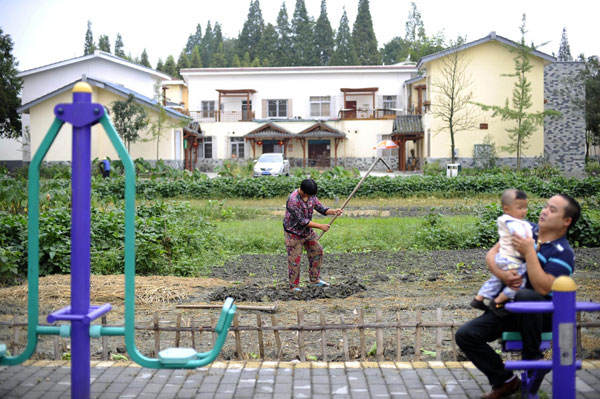Improve rural environment
Improving rural living and the agricultural production environment should be as important as urbanization, although the latter receives more attention because of its importance to economic growth. But for long-term and balanced social progress, equal importance should be attached to both.
The fruit of urbanization is much more obvious, and so is its driving force behind economic growth. That may be the reason why the method of urban development has been adopted for the construction of new rural villages in some places. Villagers were moved into new settlements that have high-rises rather than traditional bungalows with courtyards, and this practice has proved to be impractical.

A farmer works in the field in Chengdu, Sichuan province, Dec 4 2012. [Photo/Xinhua]
That may explain why President Xi Jinping said last week that construction of rural villages must be in line with local conditions and take into consideration the practical needs of villagers. Xi also said that long-term hard work is needed to thoroughly improve the living and working conditions in rural areas.
A speech about rural construction by Qiu Baoxing, vice-minister of housing and urban-rural construction, was published in People's Daily on Sunday. The speech stresses respect for the rural reality in the improvement of the rural environment. "Let rural villagers have what their urban counterparts have", he said, explaining that he was not referring to high-rises, squares or broad streets, but to quality roads, electricity, clean drinking water and adequate public services.
Rural construction requires not just money and manpower. Local leaders' awareness of what can really meets the needs of rural villagers and make rural production and life easier is most important.
There are many villages whose old houses and lifestyles are representative of a local culture. Extinction of local-culture diversity should never be the cost to pay for improving the rural environment.
To some extent, improving the rural environment is no easier job than urbanization.
What makes it so is that planners and decision-makers should never consider it as a source for local revenue. If urbanization can be considered a way to promote economic growth, utilitarianism is definitely the enemy of a healthy rural construction.
The practice of moving rural villagers into new settlements with high-rises in some places has proved to be disastrous to agricultural production and to the protection of the diversity of local culture.
Local planners' sincerity in serving rural villages and agriculture is key to the success of the construction of rural villages.
(China Daily 10/14/2013 page8)



















